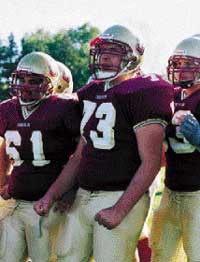

|
| The
losing streak has been especially tough on Oberlin's two senior co-captains.
The quotable Ryan Catignani and his Zechiel House roommate, center
Jordan Kaltman '01, haven't tasted victory since their first
game as freshmen. Jordan regrets taking that 1997 win for granted
--after the final gun, he ducked out of the locker room to meet his
father for dinner. Ryan remains haunted by a post-game visit by a
former Yeoman who was on the '92 team that had recorded Oberlin's
previous W. "We were going nuts in the locker room and he comes in, settles us down, and says, 'Congratulations, I know you don't want to hear this right now but you guys have to understand that this was us 40 games ago--and all we did the next game was go out and start the streak over again." Ryan laughs. "We were, like, 'Man, get out of the locker room'--and then we went out the next game and started the streak over again.' " Compounding the agony, he adds, is the post-game walk of shame. "After we lose, we'll come off the field and everybody stands up and applauds," says the amusingly unphilosophical philosophy major. "I hate that." "It just wears on you," agrees Jordan, a pre-med major. "You walk through the fence and all your friends are there saying, 'You guys played a good game' or 'It's okay, don't give up'--and that just gets to you."  Oberlin's
football history is better than its record. Established in 1891, the
Yeomen were coached in 1892 and 1894 by John W. Heisman, now best
known for the trophy awarded each year to the country's best college
football player. Over the years, Oberlin's formidable opponents have
included Michigan, Penn State, and Syracuse--though not since 1905.
And, as ESPN and sports trivia fans often point out, Oberlin still
owns the distinction of being the last Ohio-based football team to
beat Ohio State, by a score of 7-6, in 1921. Oberlin's
football history is better than its record. Established in 1891, the
Yeomen were coached in 1892 and 1894 by John W. Heisman, now best
known for the trophy awarded each year to the country's best college
football player. Over the years, Oberlin's formidable opponents have
included Michigan, Penn State, and Syracuse--though not since 1905.
And, as ESPN and sports trivia fans often point out, Oberlin still
owns the distinction of being the last Ohio-based football team to
beat Ohio State, by a score of 7-6, in 1921.Those glory days are long gone, but at least the team survived. Barely. "Over the course of my 40 years here, Oberlin has come close to dropping football three times," claims retired history professor and former Yeomen defensive end Geoffrey Blodgett '53. In 1977, he says, a motion to abolish the program was actually put to a vote among the faculty--and defeated when wealthy alumni threatened to withdraw their support for the college. "If the faculty knows anything, they know the value of money," Blodgett says. "I'm glad we prevailed, but we've been trying to justify that decision ever since." Fortunately, Oberlin President Nancy S. Dye's administration is solidly on the side of the Yeomen. In addition to endorsing the aggressive recruitment process, the college helped pay to install new carpeting in the locker room and a cushy new artificial turf in Jones Field House, the barn-like practice facility long known as a dust bowl. Oberlin alums picked up the tab for the team's first-ever plane trip to California for a game against Pomona-Pitzer earlier this season. "Pomona and Oberlin are two very similar schools--high on academics, short on football players," says Ramsey. "Arranging that game helped us compare ourselves to see where we needed to be, athletically. It also gave our students the opportunity to leave the state, to see a way of life that's different from the Midwest. "Some of them had never seen an ocean before, let alone the Pacific," he adds. "It was a great experience." Okay, so getting thumped 51--0 wasn't so great. But Ramsey contends the outcome could've been much different. "The first two plays we gained 45 yards--30 on the first play, 15 on the second," he says. "And we would've had a touchdown on the third play if not for one missed block." "That's all it takes," he insists. "It would've changed the whole game." It could take even more work to change the mindset of a small faction of students and faculty who dismiss a football trip to California as extravagant. "My freshman year the furthest we went was Richmond, Indiana," says defensive back David Smolev '02. "Some people here would rather see us lose, throw out the program, and use the money to build a bigger cello."
|